58 Search Results for assessment corner
October 23, 2017
by Carole Zangari -
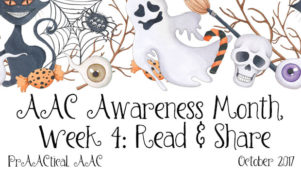
How is AAC Awareness Month shaping up in your corner of the world? Our activities for this week involve reading and sharing. Pour yourself a cup of tea, grab a mug of coffee, or just settle into your favorite reading nook for some AAC reading. Get ready to participate in the AAC Read-a-Thon Read and share this AAC information kit Read with kids 5 Books Featuring Children who Use AAC Books for Beginning Readers of Any Age Send home some fun book extension activities that help families use AAC at home Grab a book! Check out the AAC offerings from some of these publishers: Attainment Company Brill Publishing LinguiSystems Paul H. Brookes Publishing Company Plural Publishing Inc. Pearson Rowman & Littlefield Routledge Woodbine House Other/Self-published By Betsy Furler By Susan Berkowitz (resource document) What did we miss? Leave your suggestions for AAC reading material below.
July 30, 2017
by Carole Zangari -
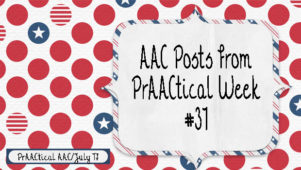
Therapy sessions, interviews, classes, make-and-take, hands-on strategy practice, report-writing….It’s been an action-packed week around here, full of AAC and literacy learning. If you also had a busy week, you probably missed a few of these posts. Monday: PrAACtically August – AAC Resources for A Year of Core Vocabulary Words Wednesday: When Helping Isn’t Helping-Prompt Awareness in AAC Instruction Thursday: Throwback Thursday – Support for Beginning AAC Communicators :::::::::::::::::::::::::::::::::::::::::::::::::::::::::::::::::::::::::: Looking for a few other posts to browse through? Here are some on AAC assessment that might be of interest. AAC Skills Assessment for Direct Selectors Observational Assessment of Beginning Communicators AAC Assessment for Children Who Speak AAC assessment modules AAC Assessment Forms See you next time!
July 6, 2017
by Carole Zangari -
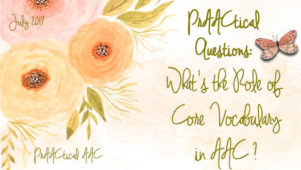
Today, we’re welcoming back Vicki Clarke, a Georgia-based SLP who has been specializing in AAC for over 25 years. Her practice, Dynamic Therapy Associates, serves children and adults with significant communication challenges in clinical and educational settings. Most of Vicki’s guest posts have been on the topic of assessment (click here to view them), but in this post, she shares her thoughts on the role of core vocabulary in AAC systems. :::::::::::::::::::::::::::::::::::::::::::::::::::::::::::::::::::::::::::::::: I’ve enjoyed listening to the wonderful presenters at the AAC In The Cloud sessions last week. It’s exciting to see AAC knowledge being shared to such a wide and varied audience! Core vocabulary was a hot topic last week so I thought it would be a good time to chat about it! At conferences, in blogs, all over the internet and from your AAC specialists, you may have gotten the memo that Core Vocabulary is an important component... [Read More...]
May 18, 2017
by Carole Zangari -
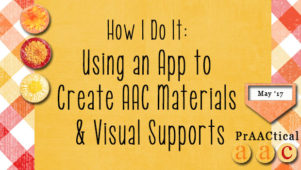
When we think of AAC apps, expressive communication and voice output generally come to mind. But there are other kinds of AAC apps, too, including those that are used to create printable materials. Today, we hear from a clinician who uses this kind of AAC app on a regular basis. Georgia Karavias is a speech language pathologist whose career has centered around working with school-aged children and adolescents who have physical disabilities and communication difficulties. Georgia is passionate about utilizing alternative access methods and inclusive technologies to enable independent communication using AAC systems. She currently works at Scope’s Communication and Inclusion Resource Centre (CIRC) as part of the communication access team in a community capacity building role. In this post, she talks about how she uses AAC and visual supports created with an app developed at her workplace. :::::::::::::::::::::::::::::::::::::::::::::::::::::::::::::::::::::::::::::::::::::::::::::::::::::::: I am a speech pathologist who has worked with children with complex... [Read More...]
December 12, 2016
by Carole Zangari -

Professionals who are involved in the selection of AAC and other AT are quite familiar with the concept of determining what features are needed and then selecting tools that have those features to sample. The feature matching process has been the gold standard for AAC device selection , though many practictioners report that its implementation may not be robust. Determining exactly which features an individual might need in their AAC or other AT is a critical part of this process, and one with which many teams struggle. In today’s post, we highlight an online resource designed to make this process easier for school-based teams. The Student Inventory for Technology Supports (SIFTS) is a free, web-based survey tool that helps teams match the needs and abilities of a student to specific AT features. It is not a comprehensive assessment tool but provides guidance to help teams in the process of AAC... [Read More...]
October 14, 2016
by Carole Zangari -

One of the best ways to enhance our teaching is to understand and respect the things that motivate our learners. We are all motivated by different things, though, and sometimes it can be hard to figure out the specifics of what a particular learner likes well enough for it to be used as reinforcement. Sometimes it’s easy. We all know kids who would do anything for [iPad time; Thomas the Tank Engine, Super Why, Pokemon, Hello Kitty] or [you fill in the blank]. We can use those in formal and informal ways to keep these learners motivated and engaged. And that’s important because, often, what we are asking them to do is hard. But sometimes, we work with people for whom those ‘magic motivators’ aren’t so clear. The ‘typical’ reinforcers don’t seem to work for those folks, and that can slow down progress. How can we figure out what motivates... [Read More...]
December 26, 2013
by Carole Zangari -
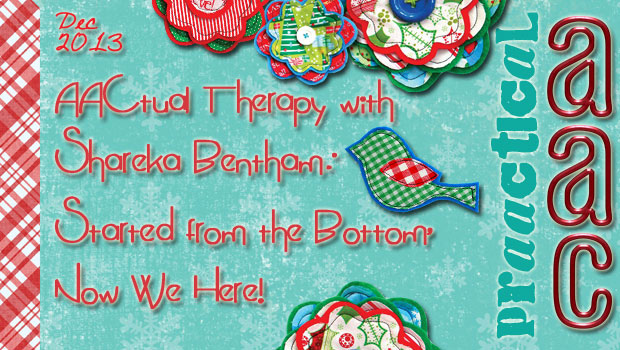
We’re so thrilled to have Shareka Bentham back as an AACtual Therapist, this time talking about her journey into high tech AAC. You can see other posts from Shareka here. One of our colleagues completed the AAC evaluation on a client of Shareka’s. While preparations for that evaluation were underway, we were fortunate enough to learn of an AAC device that was no longer needed. The family agreed to donate it to this little fellow, and that seems to have launched a whole chain of prAACtical events. Shareka takes it from here… Sadly, this is not the first step into my career as a rapping superstar, but more a description of my journey from ‘no tech’ to high tech in AAC use. If someone had told me a year ago that I would be showing off my skills on a high tech AAC device, and teaching children, parents, and teachers... [Read More...]
April 21, 2012
by Carole Zangari -
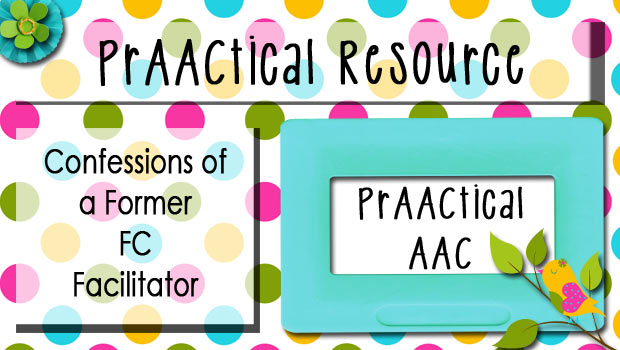
Although every field has its moments, speech-language pathology is not generally known for high levels of controversy and drama. In the AAC world, the glaring exception to that is Facilitated Communication (FC). FC has had many critics and supporters (e.g., Syracuse University’s FC Center, now the Institute on Communication and Inclusion). The editors of Evidence-Based Communication Assessment and Intervention, Drs. Ralf Schlosser and Jeff Sigafoos, have graciously allowed us to share a link to a paper by a former FC facilitator which appears in the EBP Speaker’s Corner section of the journal. You may download the article for free until June at: http://bit.ly/I7JEt4 .







